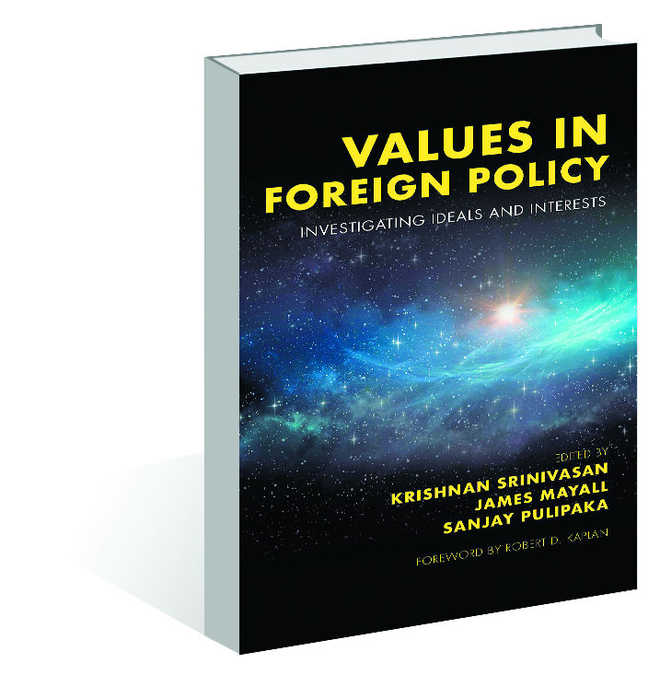
Values in Foreign Policy: Investigating Ideals And Interests Edited by Krishnan Srinivasan, James Mayall and Sanjay Pulipaka. Rowman & Littlefield. Pages 293. Rs 980
KV Prasad
It is not often that one gets to go through a book in the form of a collection of essays on foreign policy examining in considerable detail its evolution over ages and juxtaposing its application by countries in contemporary settings.
Moving away from conventional analyses, contribution by some of the most prominent strategic and policy writers, it attempts to discover the intersections of foreign policy with value systems of the country, the region and the continent and an exception — religion.
Conventionally, the craft of country’s foreign policy is around the core of national priorities and any analysis of its practice over time requires both clinical dissections without losing sight of the context in which decisions are made by a nation-state.
Editors of the book organised the essays in a manner to give the reader a sense of historical perspective, ideological moorings and values that the country espouses, and present a cogent picture.
Organised to explore the foreign policies of leading powers such as the USA, China and Russia, powerhouse from Europe Germany, Asian giants Japan, India, South Korea and Indonesia, the book also takes a look at some different strands in the form of European values both for foreign and economic policies.
Interestingly, it also takes a view on Western values from a Liberal World order to Antithetical; Islamic values in the backdrop of those pursued by Turkey and Iran and of Asian values in the context of ASEAN countries.
The chapters on the USA, India, and ASEAN are most absorbing as the contributors make a clear attempt to catch the shifting sands and drifts while looking at it from the prism of values amid an altering geo-strategic landscape.
The challenges before leadership in coming up with a dexterous policy that can be argued as steeped in culture and ethos by those who practice the craft while being aware of the shift. This paradox is described in the US chapter when the author concludes, “So the real question then is not just whether a pro-democracy establishment can withstand Trump’s initial challenge to their role in the system, but also whether they have the support of democratic publics at home and abroad. That conflicts are as old as the republic.
In the case of India, the sub-title to the chapter by an accomplished diplomat reads “Lofty Ideals Give Way to Parochial Pragmatism”, reflecting the dilemma that could be true to democratic countries across continents.
There can be arguments either way as to whether values of a country play an important role in shaping its foreign policy or whether the policy is a conclusion of a thesis by country by analysing previous patterns of behaviour vis-a- vis a country and compare it with current and emerging challenges in the region and the world.
Setting out the contours of the task at hand, the editors in their introduction note that “For several generations, the government have claimed that their foreign policy is based on a value system, and that they behave ethically in their dealings with foreign countries”.
Observing in conclusion, “It is clear from a study of foreign policy across continents that values give way to contingencies and circumstances, and above all, interests, and no government is able to chart a course by a compass of professed values alone.
The book takes a refreshingly different approach in examining foreign policy, making it an imperative read for keen students of international affairs. It also provides a bird’s eye view of the value systems of different countries and a quick study of history.



























